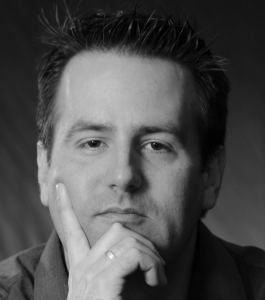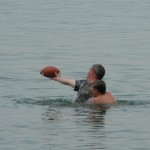The Writers of the Future Contest, more properly known as “L Ron Hubbard Presents Writers of the Future”, is quite simply one of the largest, most well-respected short fiction writing contests in the world. By some accounts, it has the fifth largest purse of any contest, and is one of the only ones without an entry fee.
When Joshua Essoe, the managing editor for Fictorian guest posts, asked me to write an article about the Writers of the Future Contest, I started out with the title “How to Win the Writers of the Future Contest”. But that article has been written before, a couple of times, by previous winners of the contest. So I scrapped that idea, and instead decided to write about the experience of winning. But that article has also been written. Dozens of times. I used to even maintain a page linking to them.
So what could I cover that hasn’t already been discussed? Well, the contest has helped to shape my career almost from the moment I decided to write seriously, so I thought I’d write a little bit about what it has done to help me succeed professionally.
I discovered WotF back when I first started writing short fiction. I’d found a battered copy of Writers of the Future Volume 9 at a used bookstore, and the title intrigued me. “Writers of the Future”. It was an anthology for undiscovered talent. I was undiscovered and, hopefully, talented. I was excited.
It was encouraging that I recognized some of the writers within. Sean Williams was a #1 NYT Bestseller and Star Wars author and appeared in the table of contents alongside noted Baen author Eric Flint (1632). So that table of contents told me that some of the authors who won the contest went on to have great careers. I wanted in.
Unfortunately, the book was old. The spine was lined with cracks and calling the cover “dog-eared” was generous at best, so I Googled the contest and, impressively, it was still going. They’d just released volume 20. Longevity is a very good sign in short fiction, and twenty years impressed the hell out of me.
The first story I submitted was called the Autobomber, which was about a robotic suicide bomber. Looking back, I can see the story’s flaws and I eventually retired it to the trunk, but at the time it was the best I could manage. Encouragingly, it won an Honorable Mention.
Honorable Mentions are something I think the contest does right. Fully 10-15% of entries will receive HMs. Though the number of entries is kept a strict secret, internet gossip places it at around 1500 a quarter, which means that some 100-150 writers receive one. This is enormous encouragement. Often it’s the first bit of positive feedback an author has received at that point in their career.
While some writers win the contest on their first attempt, it took me seven, and I was able to mark my progress by the awards that I won. At first it was Honorable Mentions, then a Semi-Finalist, then another Semi-Finalist, and then eventually my Finalist story “After the Final Sunset, Again” won 1st place in Volume 25. Because there were so many tiers of prizes, I could actually see myself improving as a writer, and that was all the encouragement that I needed.
The prize for placing as a Semi-Finalist is a critique of your story by the contest administrator. In my case, that was the late K. D. Wentworth. I’d submitted a story called Mannequin Empire, about a hot shot engineer who figured out how to transfer the consciousness of a real dog into a robot body. Now, this guy was a bit of a jerk. Think Tony Stark without the redeeming qualities. When the critique came back K. D. explained that, though the writing was good, I had written an unsympathetic main character. Because she had no reason to like my protagonist, she had no reason to read further.
By the time I received K. D.’s critique I’d already submitted my next entry to the following quarter and it too placed as a Semi-Finalist. Guess what my critique said? Unsympathetic main character. Now, this contest is judged blind, so she had no idea that the same person had written both stories. What she’d done without realizing it was to identify a major weakness in my writing.
Armed with that knowledge, I set out to create the most sympathetic character I could. A mother who fights for the life of her unborn child. “After the Final Sunset, Again” was the result and it ended up winning first place.
I’m not going to talk about what the workshop or awards ceremony was like. Google “Writers of the Future Resources” and you can find dozens of workshop blogs, my own included, that cover the experience in more detail than the space allotted to me here. Instead, let’s talk about what happens immediately after you get home from the workshop week.
One of the best kept secrets of the contest is that Author Services Inc., the people who administer it, will keep in touch with you after you win, and continue to support you in any way they can, including getting you a spot on the 2nd most watched morning show in America. They have a vested interest in helping you to succeed. The better their contest winners do, the more the contest gets a reputation for picking winners. And they’ve picked some doozies. Patrick Rothfuss, Karen Joy Fowler, David Farland, Jeff Carlson, Stephen Baxter, David Zindell…the list seems endless.
I met several pro-writers at the workshop weekend, one of whom got me my first novel contract (coming out in November. No, I can’t talk about it yet. But it’s coming). Since then I’ve been developing a close network of friends who are neo-pros and we back each other up. We share opportunities with each other and recommend one another for writing assignments. Winning the Writers of the Future contest was my entry into the world of the genre writing, and for that alone I’m grateful.
Now, no article about the L. Ron Hubbard Writers of the Future Contest would be complete without a short paragraph on Scientology. Roy Hardin was asked about it on NBC Daytime, and I’m frequently asked about it at cons. I have no feelings about Scientology either way, or any religion for that matter. However, I do believe it’s wrong to discriminate based on one’s religious preferences–no matter what they are. “Nuff said.
The fact is that, to my knowledge, everyone at Author Services Inc. (the agency that administers the Contest) is a Scientologist. However none of the judges are (or have ever been), and no Scientologist has ever been included among the winners. There are rumours of a “firewall” between the contest and the religion L. Ron Hubbard founded, and in my experience it could very well exist.
No one ever mentioned Scientology when I was down there. No one. Not even the guests at the various events we were invited to. Whatever else he did, L. Ron Hubbard was a writer first and foremost and he enjoyed paying it forward. The folks at Author Services say that they recognize that and are paying it forward in his name, and I believe them.
So, to sum up, the contest has been the gift that keeps on giving. It encouraged me with Honorable Mentions when I was just starting out, rewarded me with a win when I’d reached a certain skill level, and has helped me develop a robust network of neo-pro and pro writers who’ve become my friends. It’s more than just a writing contest, and I encourage anyone who is reading this to enter. Hopefully it’ll help you to develop your writing muscles and launch your career the way it has mine!




